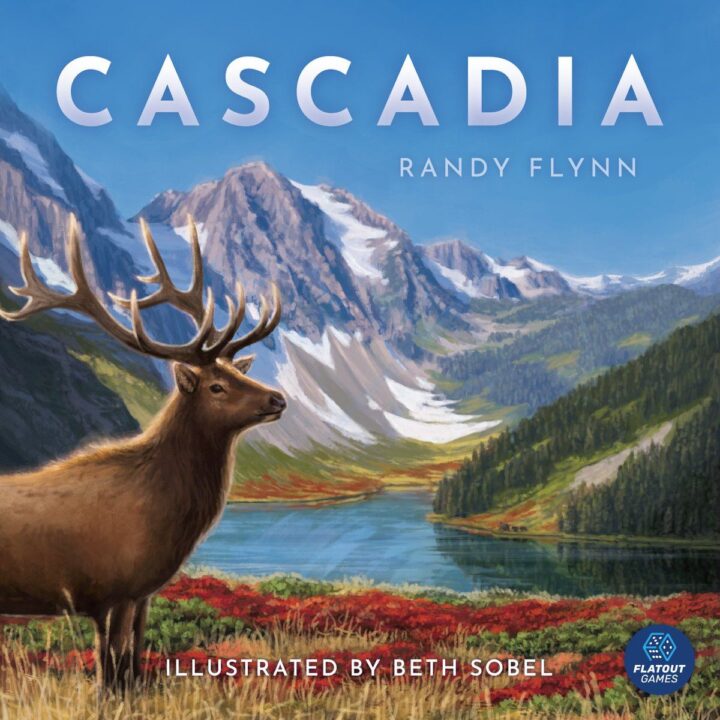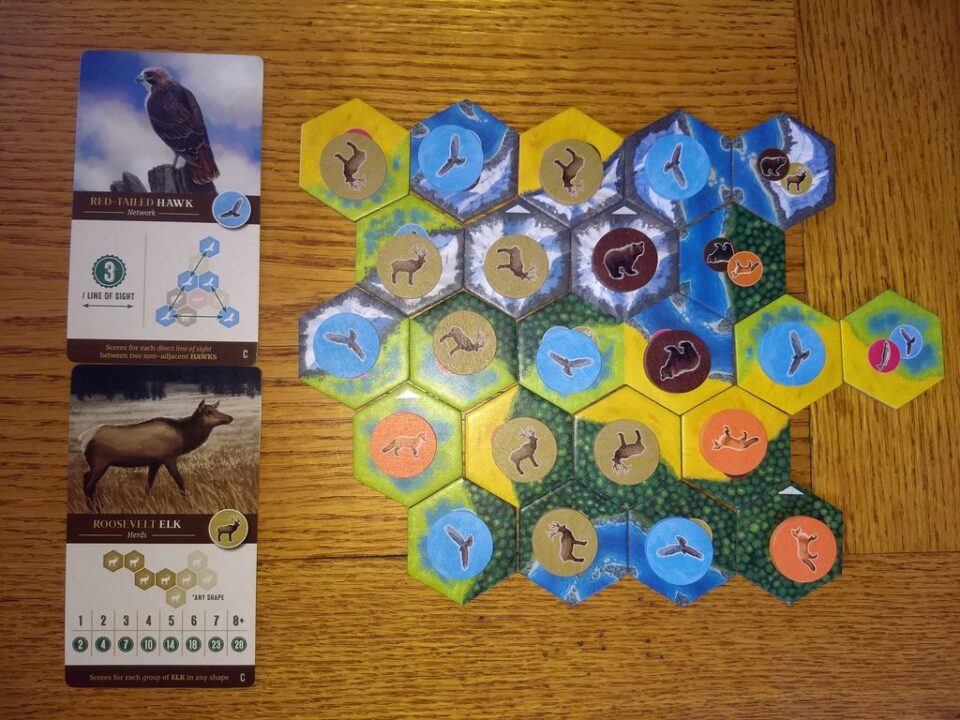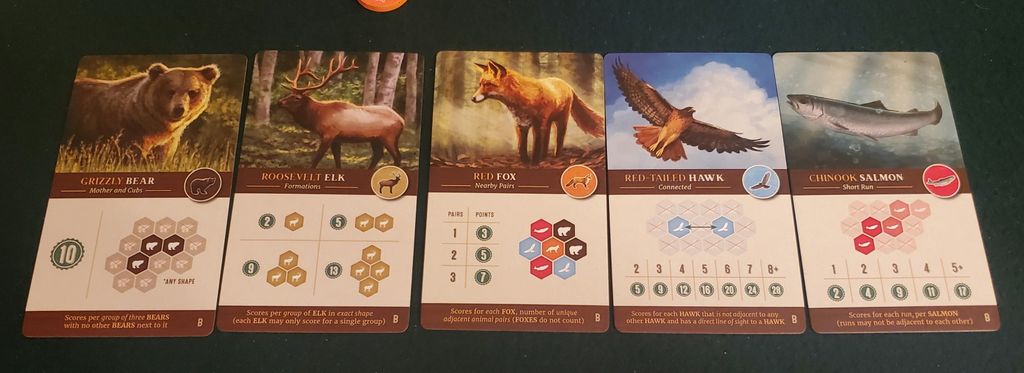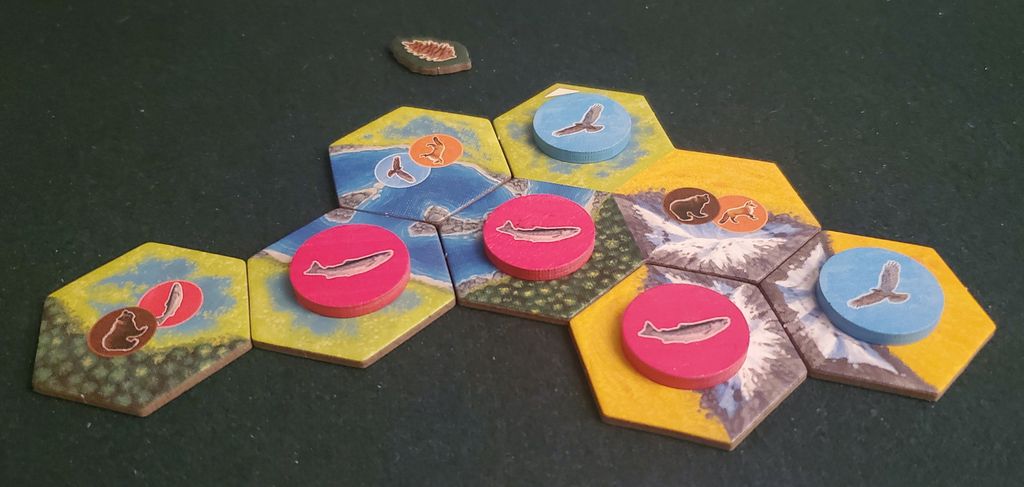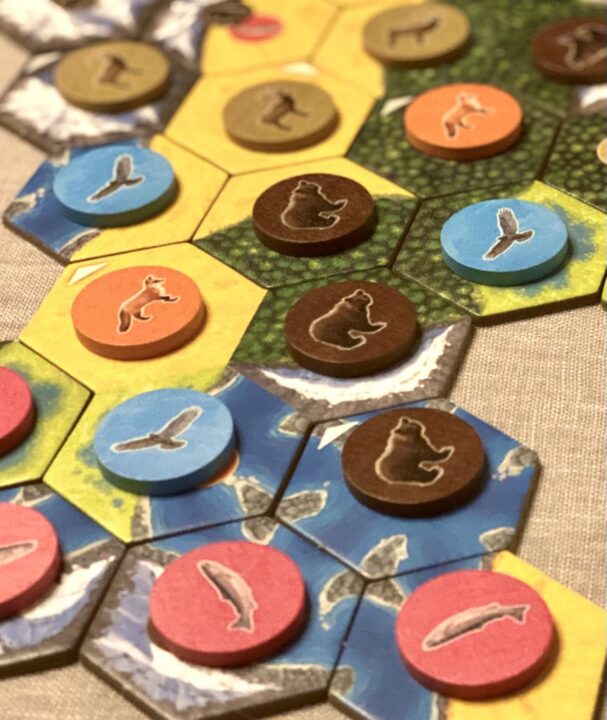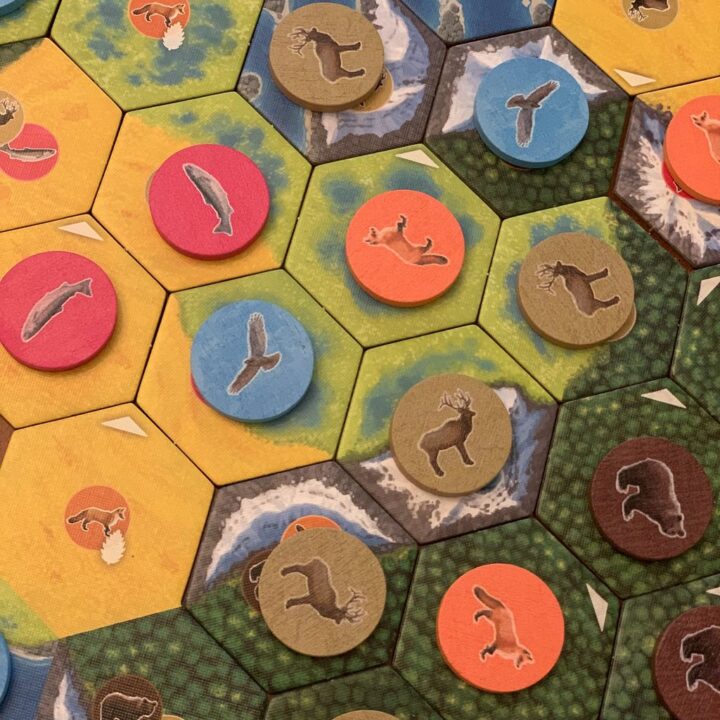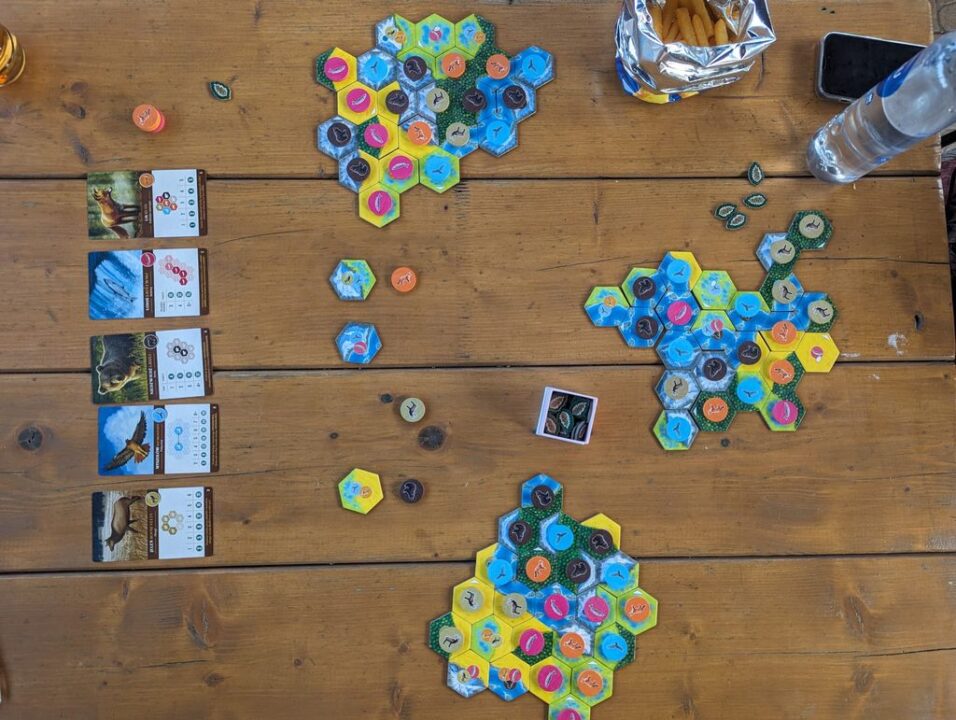Overview
Grab your binoculars and prepare for a journey into the lush, vibrant landscapes of the Pacific Northwest with our latest board game review: ‘Cascadia‘. This game has been turning heads and winning hearts with its simple yet engaging mechanics, breathtaking artwork, and a remarkable balance between strategy and luck. Whether you’re a seasoned board gamer looking for your next addiction or a newcomer hoping to dip your toes into the world of tabletop gaming, ‘Cascadia’ promises an adventure that’s as enriching as it is entertaining. Let’s explore what makes this game a must-try on game night.
How It Plays
Setting up
Setting up Cascadia is a breeze. First, lay out the board in the middle of the table. Then, shuffle the wildlife tiles and place them in a face-down stack. Put the habitat tiles in a separate stack. Each player picks a color and takes the corresponding scoring tokens. Draw the first five wildlife tiles and lay them out for all players to see. Now, you’re ready to start!
Gameplay
In Cascadia, players take turns drawing tiles from the central area to create their own ecosystem on their board. On your turn, you pick a pair of habitat and wildlife tiles. Place them on your board to create groups of the same animals or connected habitats. Each animal species has its own scoring method – some like being in large groups, others prefer specific patterns. The game encourages strategic thinking about the placement of these tiles to maximize points.
Winning the game
The game ends when the wildlife tile stack is depleted. Players then add up their scores based on the animals’ grouping and patterns, the largest connected habitat areas, and any extra points from bonus tiles. The player with the highest score wins! Cascadia challenges players to think ahead and adapt their strategy, making each game a unique experience.
Want to know more? Read our extensive strategy guide for Cascadia.
Exploring the Simple Yet Engaging Gameplay of Cascadia
Let me tell you, Cascadia is a breath of fresh air when it comes to gameplay and rules simplicity. The beauty of this game lies in its ability to welcome newcomers with open arms while still offering enough depth to keep seasoned gamers coming back for more. From the moment you open the box, you’re greeted with a set of rules that are as clear as a mountain stream. The game mechanics are straightforward – you’re tasked with creating the most harmonious ecosystem by strategically placing tiles and wildlife tokens. But don’t let the simplicity fool you; the choices you make have a big impact.
One of the things I absolutely love is that you can explain the basics to a group of friends in just a few minutes, and before you know it, everyone’s deep in strategy, making those critical decisions that feel oh-so satisfying. This easy-to-learn yet hard-to-master balance means Cascadia is a hit at game nights, without fail.
But the real question is, can strategy overpower luck in this beautifully simple game? Stay tuned for an exploration of Strategy versus luck balance in Cascadia.
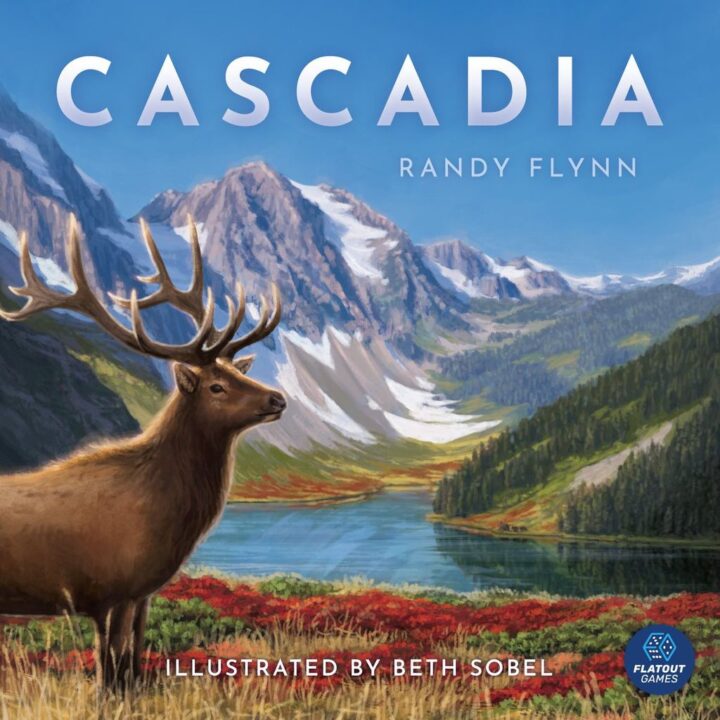
Mastering the Balance: Strategy and Luck in Cascadia
When it comes to Cascadia, you’re not just tossing dice or blindly drawing tiles from a bag. Oh no, this game has you plotting like you’re planning a surprise party for a particularly sneaky friend. Sure, there’s an element of luck in what pieces come your way, but how you place them, now that’s where the genius lies. You’ve got to think about animal patterns, terrain links, and keeping an eye on your opponents. It’s like chess, but with more bears and salmon. Every move is a blend of what fate hands you and your own sly decisions. And just when you think you’ve mastered it, Cascadia throws a curveball that keeps things fresh and exciting.
But hey, let’s not forget the canvas we’re playing on. Up next, we’ll explore the stunning quality of Component Quality and Art that brings the Pacific Northwest to life in our living rooms.
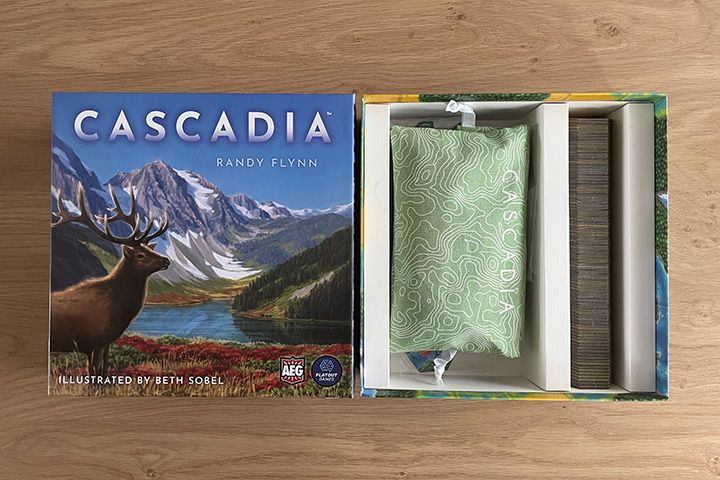
Stunning Component Quality and Art in Cascadia
When you open Cascadia, the first thing that hits you is the sheer beauty of it. The game’s components are top-notch, with durable tiles and tokens that can handle constant shuffling and placing without showing wear. The artwork? Simply breathtaking. It’s like each piece invites you into the lush, vibrant ecosystems of the Pacific Northwest. The animals and habitats are depicted with such care and detail that they almost leap off the board. This visual splendor isn’t just for show; it enhances the overall gaming experience, making each playthrough as delightful as the last.
But the high-quality components and stunning art are not just about looks. They also make the game’s setup and play smoother, ensuring everything is easy to understand and appealing to the eye. The effort put into these aspects of Cascadia truly pays off, elevating the game’s appeal to a wide audience.
Next, let’s explore how these beautifully crafted elements contribute to Replay value and player interaction.
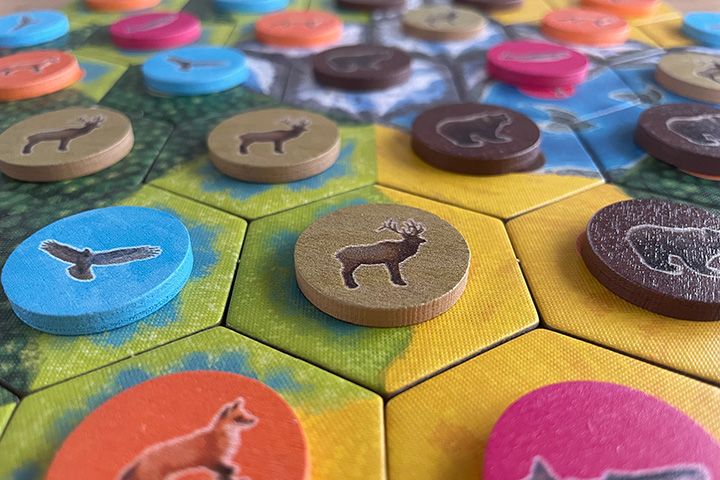
Why Cascadia Keeps You Coming Back for More
One thing’s for sure, every time I break out Cascadia for game night, it never feels old. The secret sauce? It’s the endless combos of habitats and wildlife you can create. Each game feels like a fresh challenge. You’re not just laying tiles; you’re crafting ecosystems. And who knew balancing eagles and salmon could be so addicting? Plus, there’s the strategy element. You think you’ve got the winning approach, but then your buddy snatches the tile you needed. It’s this mix of planning and adaptability that cranks up the replay value.
But what really seals the deal for me is the player interaction. This game gets everyone talking, plotting, and occasionally groaning when things don’t go as planned. It’s this blend of competitiveness and strategy that keeps my friends and I coming back for more.
In conclusion, I wholeheartedly recommend Cascadia. It’s a hit in my book for replay value and player interaction.
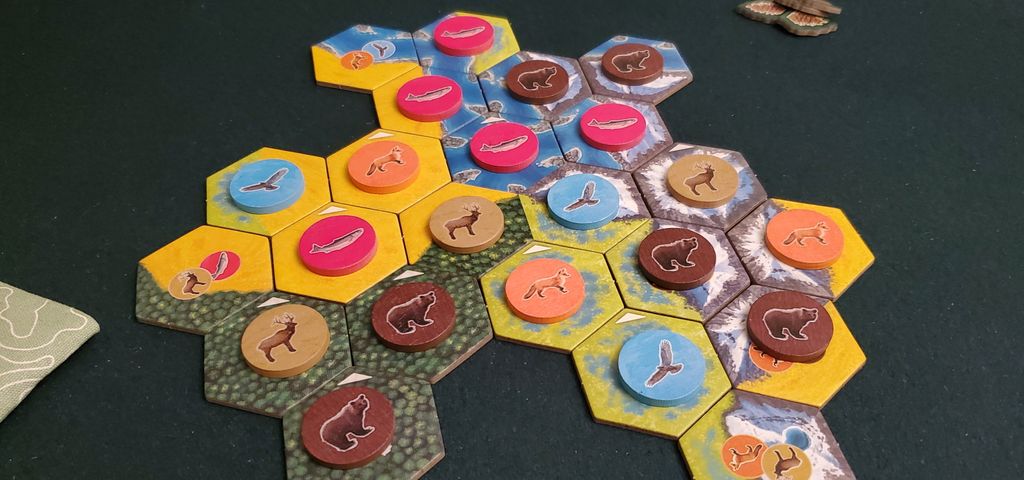
Conclusion
Wrapping up, Cascadia has sailed into my board game nights and anchored itself firmly with its easy-to-grasp rules, beautiful components, and a delightful mix of strategy and luck. It’s not just about what’s on your table; it’s about the stories you tell and the laughs you share as you lay down tiles and clump those critters together. While it does lean more on strategy, which I adore, the dash of luck keeps everyone on their toes, making each play through as exciting as the first. Yes, we’ve encountered a few moments where someone’s luck of the draw left them grumbling more at the game pieces than at their strategy. But hey, that’s all in good fun! Overall, Cascadia deserves a cozy spot on your game shelf. It’s a game that not only promises a good time with friends but also delivers every single play. So, is it worth your hard-earned cash? If you’re seeking a game that’s as engaging as it is beautiful, with enough depth to keep you coming back without feeling like you’re doing homework, Cascadia is a sure bet. Just don’t blame me if you start analyzing the wildlife in your backyard with a tactical eye!

